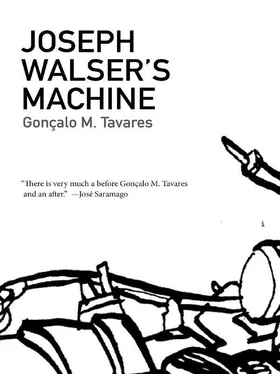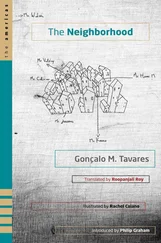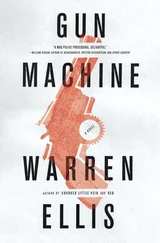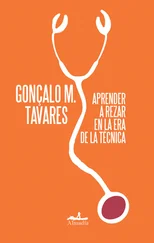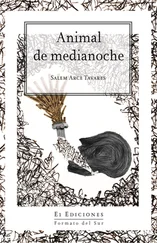He also hadn’t stopped collecting. His secret collection continued to grow, and now, after a few tanks and other military machines had entered the city, there were possibilities for his collection to become even more unusual.
Everything was undisturbed, his life was still intact, inalterable. The vile month that was foreseen had never arrived, or else it had arrived, but never came near Walser’s life. If I don’t understand this vileness, if I can’t identify it, if I don’t pay attention to its language, then I remain clean. And Walser felt clean.
On that night, his fellow players had spoken of a horse that had been lying in the middle of the road, dead, for days, decomposing more and more, yet, even so, Walser wasn’t even curious enough to ask which road it was on. He merely hoped that he would chance to walk by it, and that was that.
His uneasiness, however, had passed. It was ten thirty, and since he never went home before midnight, it was as if he were just out for a stroll, without any need to hurry, taking slow steps, feeling perfectly safe, despite the rumors of violence in some parts of the city. He was much too insignificant for anyone to come after him, for anyone to be violent with him. No one is going to direct their violence at a man like me, thought Walser, and he felt more pride than shame in this. He was taking a peaceful walk at night without any fear, without anyone bothering him. What more could he want?
Suddenly, Joseph Walser saw a woman emerge from one of the houses, taking tiny, but very quick, steps down the road, and wearing a coat that almost covered her face.
Joseph Walser stood with his hands in his pockets, alone, and smiled: “One more case of adultery,” he said under his breath. But the smile soon disappeared: Walser looked attentively at the bulky figure heading, quickly and guiltily, down the street. He recognized the coat, recognized the shoes: it was his wife.
He didn’t want to go home right away. He had time and wanted to think.
Joseph Walser was now walking at a different pace, but he hadn’t stopped for a single minute. His wife would already be home, sure enough. He looked around: he had just come to some streets that he didn’t know too well. He turned back. He wanted to see the house that his wife had come from.
He was now in front of the house his wife had exited. There was no question about it, this was the house.
Margha Walser rarely went out, and never at night. And they didn’t have any friends on this street. Joseph knew exactly what had taken place. Stupid woman, he grumbled.
The lights were all off. No sounds could be heard. In front of the house was a garden, surrounded by a little fence. It was a nice neighborhood.
Walser walked down the alley behind the street. He could see the back of the house. There was a light on in one of the rooms, but there were hardly any sounds. Someone was alone in there, maybe getting ready for bed.
It was starting to get cold. Walser remained motionless behind the house, a few yards behind its fence.
He just watched; a few images popped into his head but quickly disappeared. He was trying not to think about anything, but he couldn’t shake the image of his wife and her tiny, guilty steps as she left the house.
The only light was turned off. The house was now completely dark. He looked at his watch. He walked a little ways, gave one last look at the front door, and, finally, walked away.
All humane cities clean up the filthy mess that the passage of hell leaves behind: a few hearts pierced by shiny pieces of metal, damned by a material that is far from useless in war: a dense substance incompatible with life. A dead person gets mistaken for the fallen leaves of autumn, three hoarse or soft-spoken men pick up this dead lump with their fingers, so crucial to the city’s hygiene; among the chestnut-colored leaves is the body, also chestnut brown, but heavy. The city is efficient. In the sky above there is a different, courageous world.
Nonetheless, there are still some remnants of happiness to be found, growing. A woman is selling flowers, a dog is sniffing around with his snout in the air, as if the birds or the clouds were giving off a strong scent. But the sky doesn’t really have a scent, except after a heavy rainfall; the sky smells like water for three hours afterward, and there’s no smell gentler than this on days with no rain. The city breathes. It speaks of distant harvests, and crops stream into the city from every direction: they grow on trees, then invade the domain of Mankind. Nature pays no attention to the conspiracy of machines, the frenzied ecstasy of helicopter rotors, so eager to show off their deadly capabilities.
And Mankind, as a whole, is impervious. It is a species that survives in all the holes and crevices of the earth, resisting harsh climates, powerful bombs, and even the intensity that love instills into certain bodies at certain moments; the human species keeps its neck stretched high like a clever swan and can see over every wall; meanwhile, adolescents who pretended to pay attention to the news about their country now pretend to slip and fall, with the peaceful intention of looking up the skirts of the adolescent girls who also pretend to be concerned about their country and its problems. Everything is deceptive. It’s Sunday and in this city some of the grocery stores stay open on Sundays. There are still some pears that startle passersby, and the mere physical presence of a crate of apples manages to surprise people who have just seen six soldiers inflict great violence upon someone weak and trembling.
Evil is a category created by reason. It doesn’t have a supernatural origin, nor does it grow from the seeds found deep within the vegetables we eat. Evil is a category that comes about instinctually, to be sure, but also by reason, by intelligence. As though it were simply another tool a mathematician’s brain might employ in trying to solve a numeric equation. Deduction, induction, evil.
But as prevalent as evil is, there is something even more widespread: the universal indifference that grows out of the fact that all our bodies are separate, are violently separated from one another, even in peacetime. Each substance is incompatible with the next, and the fact that certain of our names happen to recur over and again merely conceals the obvious: no two substances can ever really share a name.
A substantial part of the city had already been conquered by this army of neutrality, which was not really an army at all: indifference. If you want to survive, put your courage in a plastic bag and wait.
All the restaurants are still open. Joseph Walser sometimes goes out with his wife on Sunday and orders lunch.
It’s Sunday and the most determined couples are kissing each other. Normal relationships don’t tolerate interruptions. A man with a glass of wine in his hand is enjoying himself. Old neighbors remain behind the windows that look out on the street, so they can tell who’s having his way with another man’s wife. Two men light a cigarette with the same match, although they each smoke their own cigarette. They exchange pleasantries. Each individual movement traces an explicit borderline between the two bodies: I am a body and I will carry out certain movements that might displease you. My movements are not responsible for your happiness.
A man who has just eaten a tangerine and is drinking wine recounts a complex anecdote in order to defend certain recent events. A number of attentive citizens listen to the careful story line of his narrative and become convinced that life will go on unchanged, if it’s true that being alive today bears any connection to the fact of having been alive yesterday. The essential characteristics of life remain. And what are these characteristics? Here are a few: there’s still water and air outside, and you can wiggle your toes even while appearing to remain completely motionless; it’s astonishing, that you can wiggle your toes while appearing to remain completely motionless. Life has certain schizoid characteristics; the following, for instance.
Читать дальше
